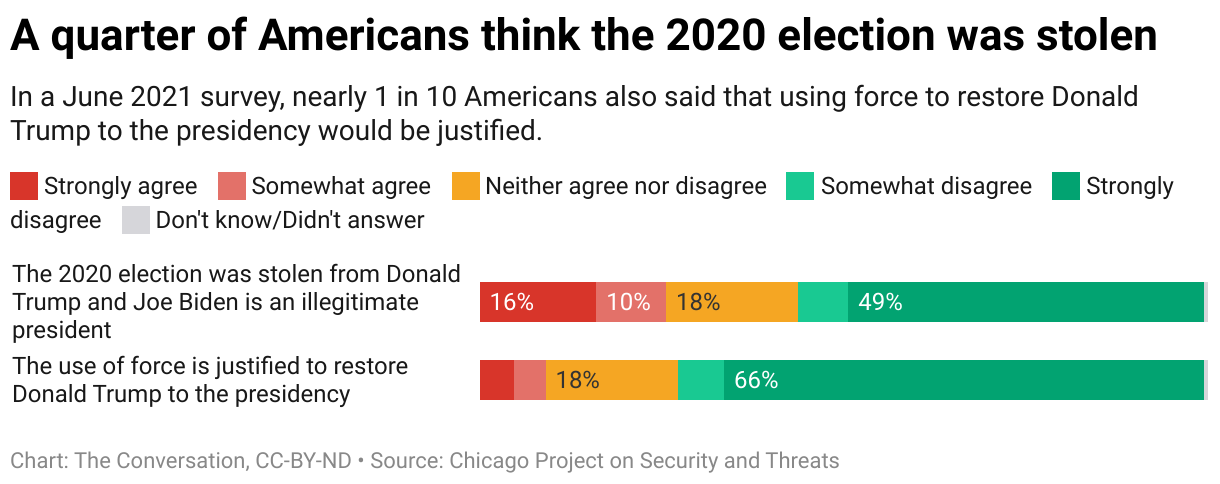Factionalism and electoral authoritarianism are the biggest threats to American democracy today
The ultimate course to curbing the power of nefarious, anti-democratic factions runs through a radical revision of our founding documents
Democratic decline starts when one party refuses to play by the agreed-upon rules. Accelerating downturn ends either when forces for good reform institutions and cut off illiberalism at its roots, or when authoritarians succeed in overthrowing the government without the consent of all the nation’s people.
America has begun its decline. The people must now choose the ending.
Given this newsletter’s ongoing focus on governing institutions and electoral reform, I thought it was only fitting to send along two articles that were published this week and discuss the subject quite well. This can all be pegged to the news yesterday that the Republican-led partisan election “audit” in Arizona reaffirmed Joe Biden’s victory in the state — and the calls from Donald Trump and his supporters for a do-over.
So here’s the first article: an essay by Robert Kagan, the well-known foreign policy thinker, titled “Our constitutional crisis is already here.” His argument is that the Constitution offers no substantial remedy for a coordinated effort to subvert election outcomes by sheer force of partisan will. To quote at length from Kagan:
The Founders did not foresee the Trump phenomenon, in part because they did not foresee national parties. They anticipated the threat of a demagogue, but not of a national cult of personality. They assumed that the new republic’s vast expanse and the historic divisions among the 13 fiercely independent states would pose insuperable barriers to national movements based on party or personality. “Petty” demagogues might sway their own states, where they were known and had influence, but not the whole nation with its diverse populations and divergent interests.
Such checks and balances as the Framers put in place, therefore, depended on the separation of the three branches of government, each of which, they believed, would zealously guard its own power and prerogatives. The Framers did not establish safeguards against the possibility that national-party solidarity would transcend state boundaries because they did not imagine such a thing was possible. Nor did they foresee that members of Congress, and perhaps members of the judicial branch, too, would refuse to check the power of a president from their own party.
You can see the problem coming a mile away. As elected officials’ partisan loyalties become greater than a sense of duty to their corresponding branch of government or devotion to liberal democracy, the probability of ~bad things~ happening increases. The attempted insurrection on January 6th, writes Jamelle Bouie in the Times this weekend, shows how a devoted faction of authoritarians spread across the government could abuse the gaping hole in our system of government:
It was always possible, theoretically, to manipulate the rules to seize power from the voters. Now, it’s a live option. And with the right pieces in place, Trump could succeed. All he needs is a rival slate of electoral votes from contested states, state officials and state legislatures willing to intervene on his behalf, a supportive Republican majority in either house of Congress, and a sufficiently pliant Supreme Court majority.
And — because many of y’all signed up to this newsletter for data, not just political theory — this is made all the more terrifying by the number of Americans who are actively rooting for subversion. Below are the results of a study done by Robert Page, a political scientist at the University of Chicago, and published last week. “We have found that 47 million American adults,” Page writes, “agree with the statement that ‘the 2020 election was stolen from Donald Trump and Joe Biden is an illegitimate president.’” Continuing:
Of those, 21 million also agree that “use of force is justified to restore Donald J. Trump to the presidency.”
Our survey found that many of these 21 million people with insurrectionist sentiments have the capacity for violent mobilization. At least 7 million of them already own a gun, and at least 3 million have served in the U.S. military and so have lethal skills. Of those 21 million, 6 million said they supported right-wing militias and extremist groups, and 1 million said they are themselves or personally know a member of such a group, including the Oath Keepers and Proud Boys.
And there is a strong partisan bent to these findings, as you’d expect. According to Page’s study, 51% of people in the group of adamant insurrectionists self-identify as members of the Republican Party, 34% see themselves as Independents — many of whom are likely “leaners” that have beliefs that tend towards the right and who more often than not vote GOP — and 10% as Democrats.
Here are some charts from his article:
The line about right-wing militias is admittedly alarming, verging on alarmist. But one million Americans is a lot of militants!
Out of the frying pan, into the…. adjacent pan that has been removed from a heating element?
Some of you might, in response, say that the solution to America’s ills is to restore The Republican party to its pre-Trump — or, really, pre-Gingrich — days. If only politics was about questions over the size and scope of government again! But such a proposal is misguided and misinformed; Misguided because there is no way to go back, and misinformed because politics was never that rational, to begin with.
You might also say the solution is to take away guns from radicalized conservatives and bar dangerous people from elected office. While these steps may help, they are at best missing the point, and at worst an undue burden on civil liberties — of weapon ownership and participatory self-government — that distracts from more reasons steps that address the root of the problem more directly. To gently step atop my soapbox (NB: perhaps I am actually beating a dead horse or sweeping a dirt floor): I think the solution lies instead in reforming our electoral rules and democratic institutions.
With the proper reforms, Americans won’t feel the need to violently overthrow their government to put their party in power, Republican elites could have a road to victory that didn’t run through Trumpist authoritarianism, and the Constitutional order would be set up to curb — rather than incentivize — the mischiefs of faction.
A few potentially effective proposals include amending the Constitution to prevent Congress from rejecting slates of electors (which directly addresses the threat of subversion), changing the mode of federal elections to make results more proportional (which would increase trust in democracy and decrease negative affective polarization), and making several tweaks to institutional powers such as getting rid of the filibuster and getting rid of lifetime Supreme Court nominations (which would simultaneously decrease the stakes of legislative elections and make outcomes more representative of the will of the majority). I encourage you to click on the link above for more along these lines.
None of these solutions will work in isolation. Neither are they all perfect — or, indeed, that pragmatic. But the point of them, broadly, is to decrease the factionalization of our politics, establish more (preferably Constitutional) roadblocks to partisan capture of our government, and cut off illiberalism at its source: discontent and out-group demonization. We must engage in these exercises or America’s democratic experiment is doomed to fail. Put another way: electoral reform will not save democracy, but you probably can’t save democracy without electoral reform.
That’s it for this Saturday post — which, notice, is a “post” rather than a “thread.” These may be meaningless distinctions for some, but I wanted this article to appear in news feeds as a more standalone piece that might better appeal to nonpaying readers who might convert, rather than strictly a short discussion post with many comments from existing subscribers. We will return to active intimate conversation next week.
I should also say this post is a bit selfish: I’m thinking a lot about the history of these ideas for a potential book proposal on the myth of the “tyranny of the majority” and a path out of minoritarian democracy, so it helps to write about the subject here for you all. But while the post is slightly self-interested I do think we will all benefit as more people write on the record about right-wing authoritarianism and the way out of this mess.
I’m sending my best to you all in the new season. The air is crisp and leaves are falling off trees here in Northern Virginia. I hope the heat has broken where you are all, too.
Elliott







What would the percentages be had the questions been "Should people who attempt to overthrow the government by force be shot?" and "Will violence be necessary to rid America of racism?"
Hi Elliott,
I'm quite pessimistic on how to achieve electoral reform and institutional reform. One of the more plausible ones is increasing the size of the House of Representatives, but even that seems unlikely.
In It's Even Worse Than It Looks: How the American Constitutional System Collided With the New Politics of Extremism by Thomas Mann and Norman Ornstein, Mann and Ornstein write
"Without a system of runoff elections or ranked preferences, a third-party candidate could well produce an outcome a majority of voters would not favor and become of a spoiler than anything else. In 2012, a centrist third-party candidate would be more likely to siphon votes from Obama, given the policies he has supported and those the Republican candidates espouse. When you have two centrist candidates running against one conservative, the advantage will clearly go to the latter, even though the conservative's positions will be less likely in line with the majority."
A third party is one of if not the most talked about solution. It dominates the discussion, but it's clearly not feasible under the current American electoral system, and most likely would backfire.
I hope you are having a good weekend,
Elliot